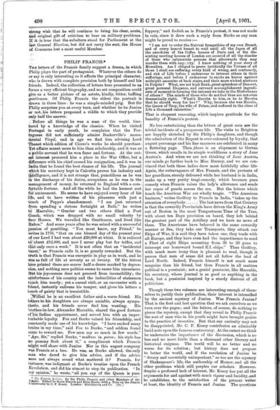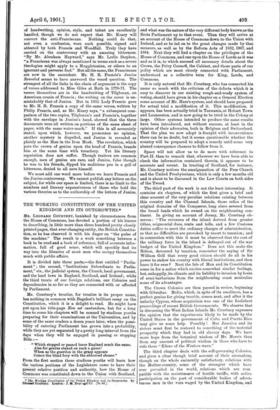PHILIP FRANCIS.*
THE letters of the Francis family suggest a drama, in which Philip plays the part of protagonist. Whatever the others do or say is only interesting as it affects the principal character, Who is drawn with complete precision both by himself and his friends. Indeed, the collection of letters here presented to us forms a very efficient biography, and no set composition could give us a better picture of an astute, kindly, bitter, baffling gentleman. Of Philip Francis the eldest the portrait is drawn in three lines : he was a simple-minded prig. But Sir Philip surprises you at every turn, and whether he be Junius or not, his letters propound a riddle to which they provide only half the answer.
Before all things he was a man of the world, tinc- tured by a knowledge of the classics. When he visited Portugal in early youth, he complains that the Por- tuguese did not sufficiently admire Baskerville's monu- inental Virgil, and in age we find him advising Lord Thanet which edition of Cicero's works he should purchase. Yet affairs meant more to him than scholarship, and it was as a public servant that he won fame and fortune. At the out- set interest procured him a place in the War Office, but a 4ifference with his chief caused his resignation, and it was in India that he found the best chance of his life. The journal which his secretary kept in Calcutta proves his industry and wtelligence„ and it is not strange that, punctilious as he was in the discharge of his duties, scrupulous as he was in the management of money, he returned to England with a com- fortable fortune. And all the while he had the keenest zest for amusement. He seems to have enjoyed every hour of his lire, and to have written of his pleasures with just a tench of Pepys's abandonment. "I am just returned fora spending a riotous fortnight at Bath," he writes Macrabie ; " Gravier and two others filled a Post (leach, which was dragged with no small velocity by four Horses. We travelled like Gentlemen, and lived like Rakes." And some years after he was seized with a successful passion of gambling. "You must know, my Friend," he writes in 1776, "that on one blessed day of the present year of our Lord I had won about 220,000 at whist. It is reduced tirabout 212,000, and now I never play but for trifles, and tilt only once a week." It is not often that an "incidental birst," as Francis calls it, is so greatly rewarded. But the tinth is that Francis was energetic in play as in work, and he Wks' as full of life at seventy as at twenty. Of the letters here printed there are scarce half-a-dozen marked by depres- sion, and nothing save politics seems to cause him uneasiness. Bat his joyousness does not proceed from insensibility; the nitsforiames of his country and the imbecilities of statesmen tOnch.laim nearly ; yet a casual visit, or an encounter with a friend, instantly enlivens his temper, and gives his letters a touch of gaiety that is irresistible.
'Vaal he is an excellent faller and a warm friend. His
4: • -
letters to his daughters are always amiable, always sympa- thetic, and his friends never find him wanting. His brother-in-law, Alexander Macrabie, shared the good fortune of his Indian appointment, and served him with an imper- turbable loyalty. Fox and Burke valued his friendship, and constantly made use of his knowledge. "I have sucked many brains in my time," said Fox to Burke, "and seldom found iliac to reward me. Few men say so much in few words." "Aye, Sir," replied Burke, "muitum is parse; his style has no gummy flesh about it," a compliment which Francis might well share with Jimins. Nor in this august company was Francis at a loss. He was, as Burke allowed, the only man who dared to give him advice, and if the advice were not always sound what mattered it ? Francis, for inptance, was indignant at Bmte's treatise upon the French Ravolution, and did his utmost to stop its publication. "In my opinion," he wrote, "all you . say of the Queen is pure • Ths Francis Letters. By Sir Philip Francis and other Members Of the rakaily. Edited by Beata Francis and Eliza Henry, wean Note on the Junius Controversy by C. F. Henry. London Hutchinson and Co. f24s.]
foppery," and foolish as is Francis's protest, it was not made in vain, since it drew such a reply from Burke as any man might be proud to receive :—
" I am not to order the Natural Sympathies of my own Breast, and of every honest breast to wait until all the Japes of all the anecdotes of the Coffee houses of Paris and of the dis- senting meeting houses of London are scoured of all the slander of those who calumniate persons that afterwards they may murder them with impl.nity. I know nothing of your story of ifiessalina. Am I obliged to prove juridically the Virtues of all those I shall see suffering every kind of wrong, and contumely, and risk of Life before I endeavour to interest others in their sufferings, and before I endeavour to excite an horror against midnight assassins at back stairs, and their more wicked abettors in Pulpits? What, are not high Rank, great splendour of Descent, great personal Elegance, and outward accomplishment ingredi- ents of moment in forming the interest we take in the Misfortunes of others ? The minds of those who do not feel thus are not even dramatically right. What's Hecuba to him, or he to Hecuba that he should weep for her ? ' Why, because she was Hecuba, the Queen of Troy, the wife of Priam, and suffered in the close of Life a thousand calamities."
That is eloquent reasoning, which inspires gratitude for the banality of Francis's protest.
No less entertaining than the letters of great men are the trivial incidents of a prosperous life. The visits to Brighton are happily sketched by Sir Philip's daughters, and though
the admiration of the Regent is over-coloured by loyalty, that august personage and his fine manners are celebrated in many a flattering page. Then "‘there is an elopement to Gretna Green, which recalls in its simple worldliness a story of Jane Austen's. And when we are not thinking of Jane Austen, our minds go further back to Miss Burney, and we are con- vinced that both these ladies drew most faithfully after life, Again, the extravagance of Mrs. Francis, and the protests of her guardians, sternly delivered while her husband is in India, make up a very pretty tragi-comedy, which becomes pure comedy when Francis raises the lady's allowance and sends her ropes of pearls across the sea. But the letters which touch the American War are wholly tragic. "The American
business," writes Godfrey to Francis in India, "takes up the attention of everybody The last news from that Country is that the cowardly Provincials have driven the King's Army out of Boston in the most Tempestuous Time of the Year, with about ten Days provision on board, they left behind the greatest part of the Artillery and we have no news of them. The Americans have behaved in the same cowardly manner at Sea, they take our Transports, they attack our Ships of War, it is said they have taken one, they trade with all Europe, and they have even had the impertinence to send a Fleet of eight Ships mounting from 36 to 26 guns to intercept our homeward bound E.I. ships." Thus Godfrey, with much more irony than is pleasant to read, though it proves that men of sense did not all follow the lead of Lord North. Indeed, Francis himself is not much more sanguine than his friend, but then Francis in all matters political is a pessimist; not a genial pessimist, like Macrabie, his secretary, whose journal is as good as anything in the book, but a pessimist inspired by a sturdy distrust of all politicians.
Though these two volumes are interesting enough of them- selves to justify their publication, their interest is intensified by the ancient mystery of Junius. Was Francis Junius ? That is the first and last question that we ask ourselves as we turn over the pages; and the letters, of course, do nothing to pierce the mystery, except that they reveal in Philip Francis the sort of man who in his youth might have brought genius
to the practice of invective. But that our curiosity may not be disappointed, Mr. C. F. Keary contributes an admirably lucid note upon the famous controversy. At the outset we think he underrates the importance of the discussion, which is no less and no more futile than a thousand other literary and historical enigmas. The world will be no better and no worse for its solution ; but history does not propose to better the world, and if the revelation of Junius be "dreary and essentially unimportant," so too are the mystery of Shakespeare's life, the authorship of Homer, and all the other problems which still perplex our scholars. However, despite a professed lack of interest, Mr. Keary has put all the arguments for and against with much vigour and lucidity, and he establishes, to the satisfaction of the present writer at least, the identity of Francis and Junius. The questions
of handwriting, opinion, style, and talent are excellently handled, though we do not expect that Mr. Keary will convert the anti-Franciscans. Nothing could do that. not even a confession, were such possible, signed and attested by both Francis and Woodfa,ll. Truly they have carried on the controversy with an amazing bitterness. "By Mr. Abraham Hayward," says Mr. Leslie Stephen, "a, Franciscan was always mentioned in terms such as a severe theologian might apply to a Muggletonian, or others to an ignorant and perverse fool." But all the same, the Franciscans are now in the ascendant. Mr. H. R. Francis's Junius Revealed seems to have answered the vexed question. The strongest of all the links in the chain of argument is the copy of verses addressed to Miss Giles at Bath in 1770-71. The verses themselves are in the handwriting of Tilghman, an American cousin of Francis ; the writing on the cover is un- mistakably that of Junius. But in 1852 Lady Francis gave to Mr. H. R. Francis a copy of the same verses, written by Philip Francis, and, as Mr. Keary says, "a subsequent com- parison of the two copies, Tilghman's and Francis's, together with the envelope in Junius's hand, showed that the three documents were all written on portions of the same sheet of paper, with the same water-mark." If this is all accurately stated, upon which, however, we pronounce no opinion, another mystery is dispelled, and Junius is revealed as plainly as the Man in the Iron Mask. The revelation, which puts the crown of genius upon the head of Francis, brands him at the same time with treachery. Yet his literary reputation does not suffer. Though traitors are common enough, men of genius are rare, and Junius, false though he was to his friends, dipped his malicious pen in a gall of bitterness, denied to all save himself.
We must add one word more before we leave Francis and the Junius controversy. We cannot publish any letters on the subject, for while our space is limited, there is no limit to the numbers and literary expansiveness of those who hold the various theories as to the authorship of the letters of Junius.







































 Previous page
Previous page